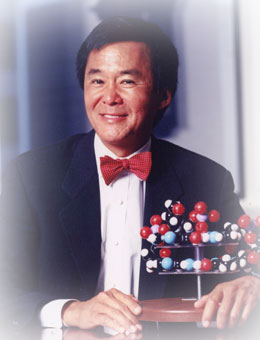|
ASIAN AMERICAN PERSONALITIES |
CONTACT US
|
ADVERTISING INFO
© 1996-2013 Asian Media Group Inc
No part of the contents of this site may be reproduced without prior written permission.
GOLDSEA | ASIAMS.NET | ASIAN AMERICAN PERSONALITIES
Titan of
Tech Trials
PAGE 3 OF 7
MC: I wrote to them and a couple of other schools and I said, 'I actually learned a little bit of law. What do you think if I could come as a second-year student?' One or two places wrote back and said, 'Nah, we can't do that.' And Harvard said, 'Okay, we'll think about it.'

I showed up and I guess I went to the registrar's office and I said I'd like to take some first year classes after I had talked them into letting me come as a second-year student. They said, 'We don't know what to do with you. Go see your class advisor.' It was similar to UCLA in that classes are very large for a law school, with over 500 students per class and each student has a class advisor. But there's only one class advisor for a class so as you can imagine, no one goes to see the class advisor.
But the people in the registrar's office said if I went to see the class advisor and he signed off on whatever I wanted to do, I could do it. I went to see him and he said what do you want to do? I said, 'I don't know anything about criminal law that would be fun and that's a first year class. Can I sign up for criminal law?' 'Okay, sign up for any of the sections.' I said I didn't want to take any of the other first year classes. He said, 'Okay,' and he signed the form and I was on my way.
GS: So you missed the other bar courses.
MC: I missed a number of other basic subjects but it wasn't that big a deal.
GS: What was Helen doing?
MC: She was teaching school. Actually when we were in Boston it was very hard at the time to get a teaching job so she decided to go to graduate school. So she went to school full time and got a masters at Boston University.
GS: What was she doing before that?
MC: In New Haven she was teaching school, and before we left LA she spent a year getting her teaching credentials and taught full time as a teacher for three years.
CONTINUED BELOW
GS: Teaching was how you met, isn't it?
MC: We were both students at UCLA because we were interested in starting English as a second language classes. Immigration laws had changed. They used to be very restrictive. I think it was something like 105 people from China were allowed to immigrate per year. In the 60s they changed the immigration laws and no one -- not the federal government, not the state government, not the school districts -- thought for a second that they should do anything to provide social services for the new influx of immigrants, including not even providing English as a second language classes.
GS: So you were both undergrads and were volunteering?
MC: We independently showed up in meetings of students, people from the local community, many happened to have been in Chinatown. We showed up and discussed how to organize, try to fund, plan English as a second language classes for immigrants.
GS: I take it you have no kids.
MC: Correct.
GS: [In an earlier interview in 1995] you mentioned as hobbies 'running long distance slowly, butchering golf courses, falling down ski slopes and swallowing water while swimming, and traveling.' Is it pretty much the same?
MC: Yes.
GS: What is your schedule like as one of the bigshots, one of the major partners, of a big firm.
MC: I don't know that I'm such a bigshot but what's the schedule like usually? It's pretty nutty. Busy all the time and enjoying it. Traveling a fair amount for business with clients or courts or whatever. But it's fun.
GS: Are you working six days a week, six and a half days a week?
MC: I work really hard, but enjoy it. That's by no means a complaint. Sometimes it involves working seven days a week. But if you enjoy what you're doing, it's fun. The word work sometimes means drudgery or unhappiness or boring or burdensome activities to other people, but I view it as having an opportunity to learn something new every day. That's one of the great things about being involved in technology. I get to learn whatever is happening on the cutting edge of biotechnology or telecommunications, computer software or computers or defense systems, radars, all kinds of other things. I can't think of another job that one could have where you could learn so much every day about something new at the very cutting edge.
PAGE 4
| "I can't think of another job that one could have where you could learn so much every day about something new at the very cutting edge." |
